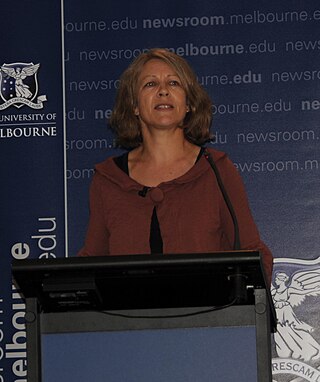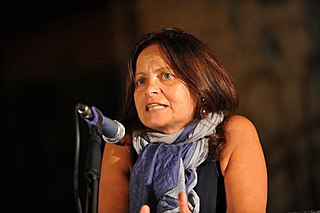
Democracy is a form of government in which the people have the authority to deliberate and decide legislation, or to choose governing officials to do so. Who is considered part of "the people" and how authority is shared among or delegated by the people has changed over time and at different rates in different countries. Features of democracy often include freedom of assembly, association, property rights, freedom of religion and speech, inclusiveness and equality, citizenship, consent of the governed, voting rights, freedom from unwarranted governmental deprivation of the right to life and liberty, and minority rights.

Sovereignty is the defining authority within individual consciousness, social construct, or territory. Sovereignty entails hierarchy within the state, as well as external autonomy for states. In any state, sovereignty is assigned to the person, body, or institution that has the ultimate authority over other people in order to establish a law or change an existing law. In political theory, sovereignty is a substantive term designating supreme legitimate authority over some polity. In international law, sovereignty is the exercise of power by a state. De jure sovereignty refers to the legal right to do so; de facto sovereignty refers to the factual ability to do so. This can become an issue of special concern upon the failure of the usual expectation that de jure and de facto sovereignty exist at the place and time of concern, and reside within the same organization.

Civil society can be understood as the "third sector" of society, distinct from government and business, and including the family and the private sphere. By other authors, civil society is used in the sense of 1) the aggregate of non-governmental organizations and institutions that advance the interests and will of citizens or 2) individuals and organizations in a society which are independent of the government.
Self-ownership, also known as sovereignty of the individual or individual sovereignty, is the concept of property in one's own person, expressed as the moral or natural right of a person to have bodily integrity and be the exclusive controller of one's own body and life. Self-ownership is a central idea in several political philosophies that emphasize individualism, such as libertarianism, liberalism, and anarchism.
Friedrich Kratochwil is a German university professor who studied at the University of Munich before migrating to the United States, then subsequently returning to Europe. He received a PhD from Princeton University.

Stephen David Krasner is an American academic and former diplomat. Krasner has been a professor of international relations at Stanford University since 1981, and served as the Director of Policy Planning from 2005 to April 2007 while on leave from Stanford.
Transnational progressivism is a concept coined by Hudson Institute fellow John Fonte about an umbrella movement that seeks to take ultimate political power away from parliaments and legislative bodies accountable to national electorates in sovereign states, and to vest it in courts, bureaucracies, NGOs, and various transnational bodies that are accountable only to themselves or to other transnational bodies. In the book "Sovereignty or Submission: Will Americans Rule Themselves or Be Ruled by Others?", Fonte describes key concepts of the movement, its conceptual framework, its ideology, the underlying philosophical tradition upon which the ideology is based, the main protagonists of the movement, and calls attention to the danger that transnational progressivism represents for traditional Western nation-centered liberal democracy.
Seyla Benhabib is a Turkish-American philosopher. Seyla Benhabib is a senior research scholar and adjunct professor of law at Columbia Law School. She is also an affiliate faculty member in the Columbia University Department of Philosophy and a senior fellow at the Columbia Center for Contemporary Critical Thought. She was a scholar in residence at the Law School from 2018 to 2019 and was also the James S. Carpentier Visiting Professor of Law in spring 2019. She was the Eugene Mayer Professor of Political Science and Philosophy at Yale University from 2001 to 2020. She was director of the program in Ethics, Politics, and Economics from 2002 to 2008. Benhabib is well known for her work in political philosophy, which draws on critical theory and feminist political theory. She has written extensively on the philosophers Hannah Arendt and Jürgen Habermas, as well as on the topic of human migration. She is the author of numerous books, and has received several prestigious awards and lectureships in recognition of her work.

Wendy L. Brown is an American political theorist. She is the UPS Foundation Professor in the School of Social Science at the Institute for Advanced Study in Princeton, NJ. Previously, she was Class of 1936 First Professor of Political Science and a core faculty member in The Program for Critical Theory at the University of California, Berkeley.

Joe Richard Feagin is an American sociologist and social theorist who has conducted extensive research on racial and gender issues, especially in regard to the United States. He is currently the Ella C. McFadden Distinguished Professor at Texas A&M University. Feagin has taught at the University of Massachusetts, Boston, University of California, Riverside, University of Texas at Austin, University of Florida, and Texas A&M University.
James Hamilton Tully is a Canadian philosopher who is the Distinguished Professor Emeritus of Political Science, Law, Indigenous Governance and Philosophy at the University of Victoria, Canada. Tully is also a Fellow of the Royal Society of Canada and Emeritus Fellow of the Trudeau Foundation.

Robyn Eckersley is a Professor and Head of Political Science in the School of Social and Political Sciences, University of Melbourne, Australia.
Anne Phillips, is Graham Wallas Professor of Political Science, Professor of Political and Gender Theory at the London School of Economics (LSE), where she is based at the Department of Government. She was elected a Fellow of the British Academy in 2003.
Articles in social and political philosophy include:
Andrew Arato is a professor of Political and Social Theory in the Department of Sociology at The New School, best known for his influential book Civil Society and Political Theory, coauthored with Jean L. Cohen. He is also known for his work on critical theory and constitutions and was from 1994 to 2014 co-editor of the journal Constellations with Nancy Fraser and Nadia Urbinati.

Alessandro Ferrara is an Italian philosopher, currently professor of political philosophy at the University of Rome Tor Vergata and former president of the Italian Association for Political Philosophy. He also teaches legal theory at Luiss Guido Carli University in Rome.

Raffaele Marchetti is an Italian political scientist and editorialist.
Cristina Lafont is Harold H. and Virginia Anderson Professor of Philosophy at Northwestern University.

Nadia Urbinati is an Italian political theorist, the Kyriakos Tsakopoulos Professor of Political Theory at Columbia University.
Cécile Laborde is a professor of political theory at the University of Oxford. Since 2017, she has held the Nuffield Chair of Political Theory and in 2013 she was elected a Fellow of the British Academy. Her research focusses on republicanism, liberalism and religion, theories of law and the state, and global justice. Her most recent book, Liberalism's Religion, was published by Harvard University Press in 2017.









